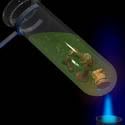Harold van der Heijden’s Endgame Study Database III gives the following details about the study:
B. Horwitz
Neue Berliner Schachzeitung, 1871
[d]8/p1p5/3p4/p3p3/3k1p2/1K2b1p1/1NP4p/7B w - - 0 1
Win
mate in 22 that programs do not see
Moderator: Ras
-
Sylwy

- Posts: 4924
- Joined: Fri Apr 21, 2006 4:19 pm
- Location: IAȘI - the historical capital of MOLDOVA
- Full name: Silvian Rucsandescu
Re: mate in 22 that programs do not see
For the study all is clear for me: belongs to B.Horwitz.
But the "HorOwitz bishops " in chess strategy is another matter !
Regards,
Silvian
But the "HorOwitz bishops " in chess strategy is another matter !
Regards,
Silvian
-
rlsuth
- Posts: 322
- Joined: Wed Mar 08, 2006 9:37 pm
Re: mate in 22 that programs do not see
After 12 hours, Fritz 11 can see a mate in 60 for black, while the best move for white, so far, is c3+ which leaves black with a 3 point advantage.
Then again, Fritz is only seeing 15 complete moves deep at this stage.
Then again, Fritz is only seeing 15 complete moves deep at this stage.
-
smirobth

- Posts: 2307
- Joined: Wed Mar 08, 2006 8:41 pm
- Location: Brownsville Texas USA
Re: mate in 22 that programs do not see
I still suspect I am correct, although I am not really 100% certain. One piece of evidence is that a Google search of "horwitz bishops" gives 29 hits, "horOwitz bishops" gives only 7 hits. On this page Horwitz is specifically given credit. Also on this page, which mentions both Horwitz as well as Horowitz, and specifically states that the bishops are named after Horwitz. I suspect that people often confuse the two since Horowitz was more contemporary and thus is a little bit better known. Perhaps someone should contact chess historian Edward Winter. If anyone could give a definitive answer it would be Winter.Sylwy wrote:For the study all is clear for me: belongs to B.Horwitz.
But the "HorOwitz bishops " in chess strategy is another matter !
Regards,
Silvian
- Robin Smith